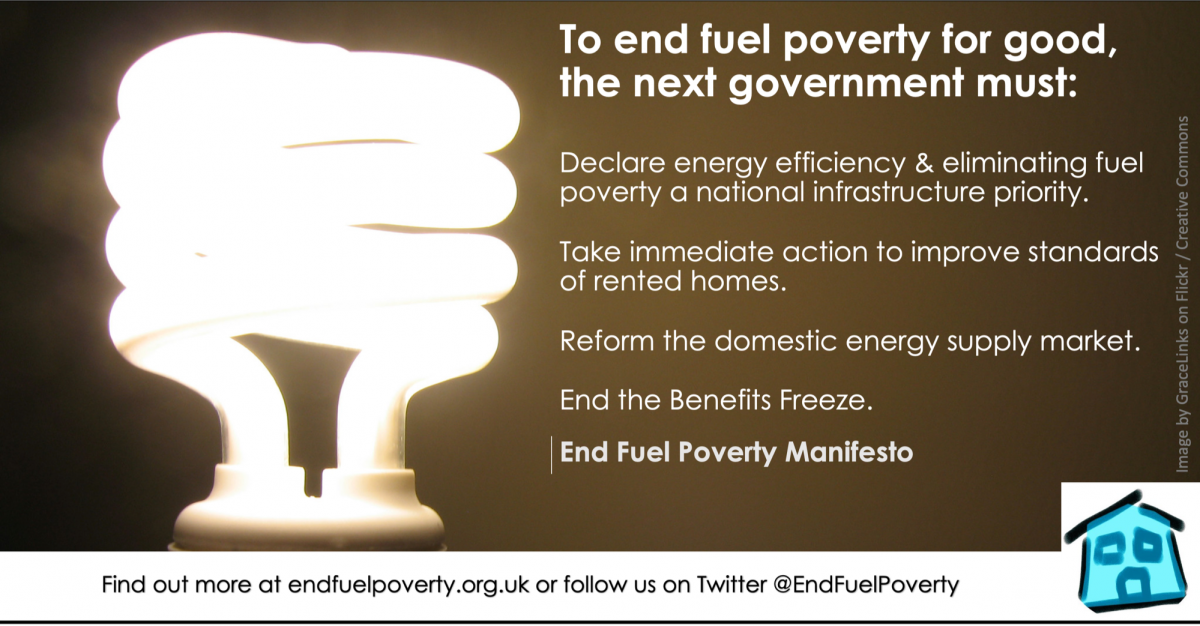The End Fuel Poverty Coalition has called on all political parties to adopt four pledges to end the scourge of fuel poverty in England.
A full copy of the Manifesto is available for download and prospective Parliamentary Candidates wishing to show their support can do so by signing up online.
Fuel poverty means that a household is forced below the poverty line as a result of the cost of using energy in their home.
According to the latest definition of fuel poverty, almost one in five households are in fuel poverty in England alone (BEIS).
Fuel poverty is caused by low income, high fuel prices, poor energy efficiency, unaffordable housing prices and poor quality rental housing.
It can lead to respiratory, circulatory and mental health problems (PHE) as well c.15,000 winter deaths caused by cold homes (NEA). In children, it can lead to developmental problems and poor performance at school (NCB). It can also lead to people taking days off work (IPPR).
The End Fuel Poverty Coalition calls on all political parties to commit to a Manifesto that will end fuel poverty for good. To achieve this, the next Government must:
- Declare energy efficiency and eliminating fuel poverty a national infrastructure priority.
- Take immediate action to improve the standards of rented homes.
- Reform the domestic energy supply market.
- End the Benefits Freeze and address the chronic scale of unclaimed benefits
Jacky Peacock, Director of Advice4Renters, said:
Without more ambitious action, people will be condemned to fuel poverty for decades to come. As well as the devastating impacts cold homes have on their occupants, the delayed cost of inaction extends to all of us.
Addressing fuel poverty is a crucial part of meeting new stretching carbon reduction targets. Without a big improvement in current efforts, the government will not meet its climate change targets.
Ruth London of Fuel Poverty Action, added:
Ending fuel poverty is in our grasp if a National Energy Efficiency Programme is combined with fully funded support for people in fuel poverty, reform of the private rented sector, effective accountability to social housing residents, and proactive, genuinely independent and fully empowered local authority supervision of retrofits and new residential construction.
As well as providing detailed recommendations to policy makers, the Coalition Manifesto sets out the benefits to ending fuel poverty.
Improving the energy efficiency standards of Britain’s homes could cut household bills by around £370 a year, while reducing reliance on gas imports by a quarter. It would also boost economic growth, create jobs in every constituency of the country and reduce pressure on health and social care services.
Improved winter warmth and lowered relative humidity have proven benefits for cardiovascular, respiratory, and mental health. For every £1 spent on retrofitting fuel-poor homes an estimated £0.42 is saved in UK National Health Service spending.
Peter Smith, Director of Policy and Research at National Energy Action (NEA), said:
Ending fuel poverty is a crucial part of meeting new stretching carbon reduction targets and improving health and well-being.
The key actions that are necessary are in our grasp and have cross-party support. We hope our recommendations will be acted on by all the main political parties within their manifestos.”
A full copy of the Manifesto is available for download.
Prospective Parliamentary Candidates wishing to show their support for the End Fuel Poverty Manifesto can do so by signing up online, emailing info@endfuelpoverty.org.uk or completing the form below.

